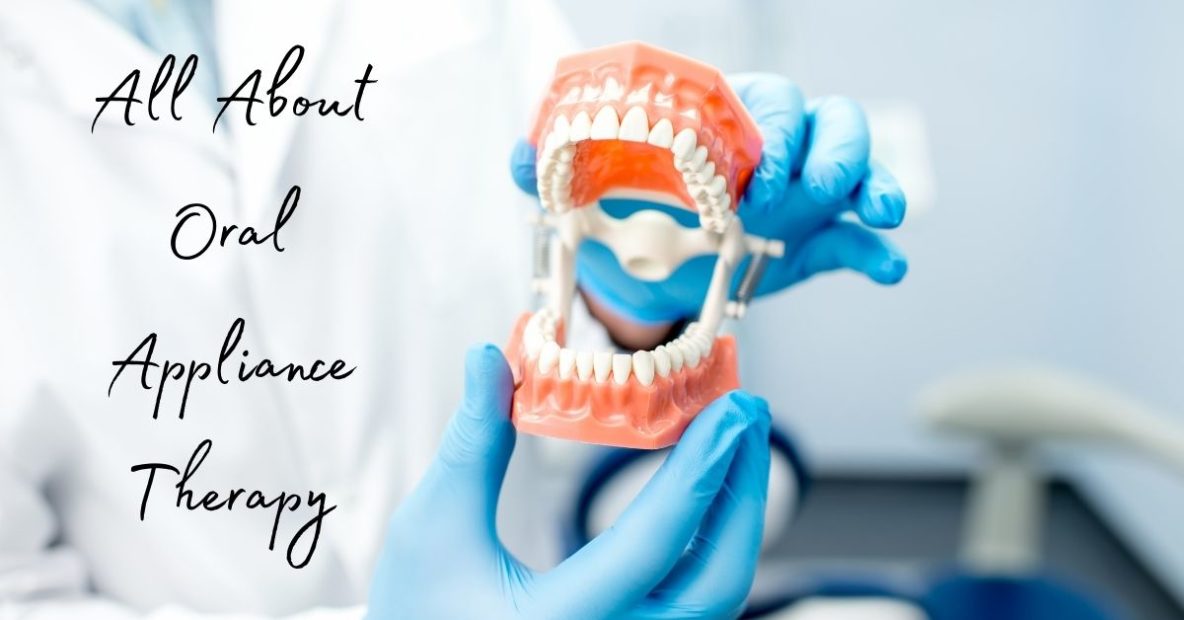All About Oral Appliance Therapy

- A Promising Paradigm Shift: New Research Challenges the CPAP-First Approach to OSA Treatment - September 5, 2023
- Understanding Sleep Meditation Techniques - July 30, 2021
- How Online Learning Has Affected Sleep for Students - July 13, 2021
Are you having difficulty sleeping? Do you wake up feeling tired and groggy in the morning? If you’re having a hard time getting enough sleep, it’s time to find out why you’re not sleeping, and find ways to sleep better. One way to get a good night’s sleep is with oral appliance therapy.
Do You Have Obstructive Sleep Apnea?
Before we talk about oral appliances, let’s review what we know about obstructive sleep apnea. If you’ve been sleeping poorly, you may have sleep apnea. This is a common condition that affects roughly 18 million Americans. Obstructive sleep apnea is a condition that blocks or obstructs your airway during sleep.
When you fall asleep, your whole body relaxes. All the muscles in your throat relax as well. However, for some people these muscles get too relaxed during the night, and your airways will become blocked. Your brain will realize there’s no oxygen coming into your lungs, and you’ll consciously or unconsciously wake up for a few moments to tighten the muscles. This restarts your breathing, and you’ll fall right back to sleep.
Symptoms of Obstructive Sleep Apnea
Sleep apnea leads to poor quality sleep and daytime fatigue. You’ll struggle to stay awake and alert during the day. Some of the symptoms of sleep apnea can include:
- Irritation and moodiness
- Morning headaches
- Dry mouth
- Drowsiness
- Exhaustion
- Difficulty concentrating
- Increased stress
Some of the nighttime consequences of sleep apnea include:
- Loud or disruptive snoring
- Insomnia
- Pauses in breathing during sleep
- Waking up gasping for air
If you have obstructive sleep apnea, you’ll notice these daytime and nighttime symptoms.
What is Oral Appliance Therapy?
One way to treat obstructive sleep apnea is with oral appliance therapy. We recommend oral appliances for people with mild cases of sleep apnea. Oral appliances are similar to a mouth guard worn by athletes or an orthodontic retainer worn after removing braces. You’ll only wear this oral appliance during the night. These appliances fit comfortably into your mouth and they’ll prevent obstructive sleep apnea in a few ways, such as:
- Preventing the collapse of the tongue and keeping the airway open
- Preventing the collapse of the tissues at the back of the throat
- Slightly extending the lower jaw to prevent an obstruction of the throat
- Anchoring the teeth to keep the airway open
Oral appliance therapy can help you get a good night’s sleep without worrying about your sleep apnea.
Taking a Sleep Test
Before starting oral appliance therapy, you need to find out if you have obstructive sleep apnea. At Sound Sleep Medical we’ll do several screenings and tests to determine if you have a sleep disorder. We may also refer you to another specialist for a polysomnogram or sleep test to find out more about your sleep.
During the consultation, we’ll also review your medical history and do a physical exam to rule out any other causes of your sleep disorder. If you have a partner, we’d like to ask them a few questions about your sleeping habits. For example, have they noticed you snoring, making gasping sounds, or waking up in the night?
Physical Exam
The first step in starting oral appliance therapy is to have a complete clinical exam. We’ll talk about your overall health, and find out if you have any oral issues that could affect the oral appliance therapy. We’ll also do a physical exam of your throat, uvula, mouth, and nose to look for any unusual or large tissue that could be blocking your airway.
Choosing Your Oral Appliance
Next, we’ll go over your oral appliance options, and find the style that suits your needs. All oral appliances are designed to stop your airway from collapsing during sleep. This could be either through supporting the jaw or holding the tongue in place. There are two main types of oral appliances that can treat your sleep apnea.
- Tongue retaining devices: These oral appliances hold your tongue in place during sleep so that your airway stays open all night.
- Mandibular repositioning devices: These oral appliances will reposition your lower jaw and move it slightly forward so that your airway is open during the night.
At Sound Sleep Medical, we’ll help you find the right oral appliance therapy to help you sleep soundly through the night. Contact us today to schedule a consultation!
